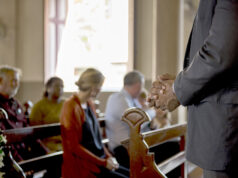By Lorene Hanley Duquin, OSV News
Do you feel like you’re on a treadmill that never stops? Do you need some quiet time? Some family time? Some time when you can renew your mind, your body and your spirit?
Then maybe it’s time to reclaim Sunday as a day of rest!
There was a time when Sunday was a special day. People went to church on Sunday morning. The afternoon was a great time for a good book, a visit to friends and neighbors, or a little nap. Families gathered for Sunday dinner. Children played with their cousins. Stores, banks, businesses, schools, and libraries were closed. It was unthinkable to do laundry or housecleaning. Sunday was the Lord’s Day. It was a special day, a day of celebration, a day of rest.
Times have changed.
Nowadays, Sunday seems like just another day. Parking lots at supermarkets and shopping malls are packed with cars. Many of us work on Sunday. Too few families have time for family dinners or playing with cousins. It seems like fewer Catholics than ever see Sunday as a reason for celebration or for rest.
We live in a world economy that operates 24 hours a day and 7 days a week. Parents juggle work demands in addition to the busy schedules of children involved in school, sports, scouts, music and other activities. Sunday has become another day for catching up on errands, chores and social media feeds.
But we have to ask ourselves if this is a good thing. What implications does our round-the-clock world have on our physical, mental, emotional and spiritual well-being?
Experts agree that it is important to balance activity with rest. Physical, mental and emotional strain depletes your energy and produces feelings of tension and fatigue. Rest gives your body a chance to replenish itself.
But there’s a spiritual component involved, too. Pope Benedict XVI warned: “The men and women in our technical age risk becoming victims of their own intellectual and technical achievements, ending up in spiritual barrenness and emptiness of heart.”
Consider the old story about African tribesmen who had to carry goods from one village to another village. On the first day, they traveled faster and farther than expected. The next morning, they refused to move. They insisted that they had gone too quickly the first day, and they had to wait for their souls to catch up with them.
When we observe Sunday as a day of rest, it offers us physical renewal, but it also gives our souls a chance to catch up with our busy lives. Sunday offers us the opportunity to reflect on the spiritual side of our existence, to appreciate our blessings, and to draw closer to God.
When we set aside time for God, we begin to see everything from a different perspective. Our lives no longer spin out of control, because we know in the depths of our being that God is in charge. We can let go of our own agendas. We can look forward to Sunday as a holy day because we begin to see that, ultimately, everything rests with God.
If you are going to reclaim the Lord’s Day, you have to make it a priority. Imagine what your Sunday would be like if you and your family decided to “keep Sunday holy.”
What kinds of things would you do? What kinds of things would you refrain from doing? Would you start new traditions? Would you resurrect old family traditions?
The best advice for modern-day Catholics who want to reclaim Sunday as a day of rest is to start slowly. Remember, there are no mechanisms in today’s society to support your decision to make Sunday a holy day.
Think of one thing that you will stop doing on Sunday and replace that one thing with something spiritual or restful that puts God into your Sunday in a special way. Once this becomes a normal part of your Sunday, drop something else and replace it with another new activity that will help you to make Sunday holy.
If you haven’t been going to Mass every Sunday, this is the best place to start. Make the commitment to attend Mass every week to hear God’s words in the Scripture and be nourished by the Eucharist. When you plan how you will spend your time, you prioritize by putting the most important items first and building around them.
Another possibility is to make a conscious effort to try to take care of shopping or household needs during the week or on Saturday. That doesn’t mean you can’t run to the store on Sunday if you’re out of milk or need a prescription refill. It means that you’re making an effort to restrict your activities on Sundays.
How you find rest and holiness on Sunday will depend on what you do during the week. If you are sedentary most of the week, an outdoor adventure on Sunday will give you a chance to appreciate God’s creation. If you are engaged in physical labor during the week, Sunday can be a quiet day to restore yourself. If you’re with people all week, you might build some solitude into your Sunday. If you don’t get a chance to see family members as often as you’d like during your workweek, Sunday could become your family day.
If your job requires that you work on Sunday, you don’t have to quit. Instead, try to incorporate the holiness of the day into whatever you do. Try to set aside some time during the day to reflect on God.
In the story of creation, God rested on the seventh day — not because he was tired, but because he wanted to give us an example of how to live. He gave us dominion over everything he created, and then showed us that work is not an end in itself. He created a day of rest. When God gave Moses the Ten Commandments, he reminded us “to keep holy the Sabbath day.”
Jesus observed the Sabbath, but after his death, the early Christians moved their observance from Saturday to Sunday for two reasons: Sunday was the day Jesus rose from the dead, and it was also the day that the Holy Spirit descended upon the apostles gathered in the upper room.
Keeping Sundays holy does not mean that you become a watchdog over yourself or other people. It means making room for rest and gratitude. Jesus reminded us that “The Sabbath was made for man, not man for the Sabbath” (Mk 2:27).
Lorene Hanley Duquin is a Catholic author and lecturer who has worked in parishes and on a diocesan level.









